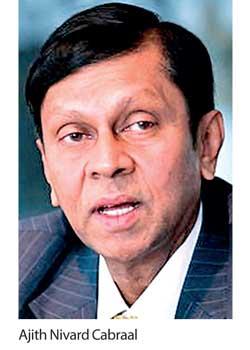Reply To:
Name - Reply Comment
Central Bank Governor Ajith Nivard Cabraal refuted claims made by foreign media that Sri Lanka is going to talk to the International Monetary Fund (IMF) for a rescue package and the Fund-led debt restructuring.
 Responding to various foreign media reports, which were filed in last few days claiming that Finance Minister Basil Rajapaksa will be travelling to the Washington D.C in mid April to negotiate a debt restructure with the IMF, the Governor said the visit was not for that purpose.
Responding to various foreign media reports, which were filed in last few days claiming that Finance Minister Basil Rajapaksa will be travelling to the Washington D.C in mid April to negotiate a debt restructure with the IMF, the Governor said the visit was not for that purpose.
The IMF and the World Bank Group Spring Meetings are held from April 18 to April 24, 2022 and provide a platform for global central bankers, finance ministers, private sector executives, civil society and academics to make their representations on economic issues.
“Meetings of Sri Lankan authorities with IMFN officials over the next few weeks are not for the purpose of debt restructuring as stated by some news agencies,” Cabraal said taking to Twitter.
However, the economic analysts have been calling for an IMF-backed debt restructuring for Sri Lanka to ensure that a soft economic landing as the country has approximately US$ 4.0 billion per annum in debt repayments with US$ 2.0 billion of foreign reserves in hand.
In any case, the Central Bank, although a bit too late, has already delivered many of what could come with a potential IMF programme, i.e. floating of the currency and tightening monetary policy. But the government is yet to implement other key reforms such as cost-reflective fuel and electricity prices, disposing of non-strategic State assets, etc. as per the eight-point policy package presented by the Central Bank.
While the proposed reforms will have much pain on the public, as reflected by the Central Bank’s move to float the currency, which led all consumer prices to spike.
These are necessary reforms for to ensure a sustainable economic growth path for Sri Lanka.
Educating the public of the necessity of these reforms is critical, as they should know that their incomes would gradually adjust to the higher prices in the economy as employers will have to raise salaries of their workers to match the inflation.
The self-employed such as masons, carpenters, taxi drivers and the likes would charge higher fees and rents to commensurate with the cost of living.
However, the government has to ensure that they immediately provide assistance by way of cash transfers to those segments in the society who have become a casualty of the recent price increases and thereby had to forgo on consumption.